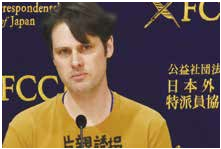Issue:
In a press conference at the FCCJ, a father convicted of trespassing for attempting to contact his children plead his case
IT HAS BEEN MORE than 250 days since Scott McIntyre’s last had contact of any kind with his two young children, whom he claims were taken by his estranged Japanese wife from their home in Tokyo last May.
McIntyre’s eight month search for his son and daughter, aged 8 and 11, has come at a price. In early January, the Australian journalist was given a six month prison sentence, suspended for three years, after being found guilty of trespassing last October. He had gained access to a common area of the apartment building where his parents in law live by following a resident through the main doors and was arrested a month later.
Speaking at the FCCJ after he appeared at the Tokyo district court, McIntyre accused the Japanese authorities of abusing the human rights of an estimated 100,000 children in Japan who are abducted by one parent and then denied any contact with the “left-behind” parent. Wearing a T-shirt calling for Japan to end to parental child abduction, McIntyre said his conviction would not stop him from campaigning for a change in Japanese law to allow courts to award joint custody when parents separate or divorce.
The UN convention on the rights of the child states that abduction is illegal and children have the right to maintain regular contact with both parents, he said, adding that child abduction was also illegal under Japan’s penal code. “This is a group I never wanted to belong to,” he said. “But it is a fundamental human right for children to be with both parents, enshrined in international treaties and obligations that Japan has ratified.”

McIntyre is one of a number of foreign parents who say they have been denied access to their children after separating from or divorcing their Japanese spouses. The Hague convention on international child abductions, which Japan ratified in 2013 after years of pressure, requires parents accused of abducting their children to return them to their country of habitual residence. But the convention does not apply to cases involving couples living in Japan, even if one of the parents is a foreign national, and Japanese courts almost always award custody to the mother.
“The people talking about this are foreigners, but in many ways we are the ones who are least impacted,” McIntyre said referring to the 90 percent of abduction cases that involve Japanese couples. “We want to give a voice to everyone. It’s not the mark of a tolerant, modern society to have a system that encourages the abduction of children.”
The solution was simple, he said.
“We need to change the law from one of sole custody to joint custody, and then the abductions of children end tomorrow. That will be of great benefit for parents, children, and also Japanese society, because children will be able to grow up with the love of support of both parents.”
Japanese authorities have shown no enthusiasm for a change in the law, despite international pressure that has included personal interventions on behalf of their citizens by the French president, Emmanuel Macron, and the Italian prime minister, Giuseppe Conte. “Children are being removed from their culture, their history and their background,” McIntyre said. “And this is all because Japan refuses to do what every other G20 nation has done an implement a system of joint custody. It’s a basic, fundamental human right.
McIntyre believes this issue is bringing shame to Japan. “The police are not working, the government is not working and the judicial system is not working,” he said. “These are state sponsored kidnappings. This is only going to change when Japanese people understand what is happening and when Japanese parents speak out.”
McIntyre’s plight has again drawn attention to Japan’s treatment of suspects, an issue that attracted global media coverage following the arrest, detention, and escape of the fugitive former Nissan chairman, Carlos Ghosn. McIntyre, who spent 45 days in detention, was initially taken into custody at Takaido police station in western Tokyo before being charged and transferred to the city’s main detention centre in Kosuge.
Like Ghosn who was held at the facility for a total of more than 120 days before he was released on bail for a second time last April McIntyre spent all but half an hour a day in his tiny cell, which was lit day and night. He shared cells with men charged with serious crimes, including rape and murder. He was not permitted to stand inside his cell, and was only allowed to lie down for two hours in the afternoon and at night. When he complained about sleep deprivation, he was threatened with solitary confinement or told he would be placed in a straightjacket.
He is aware that his enforced separation from his children could continue until they reach adulthood. The police, the family court, McIntyre’s in-laws and his children’s school have all failed to act on his requests to help locate his children, he said, despite being presented with evidence that they are the victims of parental child abduction.
“I don’t know if they’re alive or if they’re dead,” McIntyre said. “I don’t know anything about their education. I don’t know if they’re in Japan or abroad. As a parent, it’s heartbreaking.” Asked if he had a message for his children, McIntyre said: “I love you very much and want to see you as soon as I can.”
Justin McCurry is the Japan and Korea
correspondent for the Guardian and Observer
newspapers. His book, War on Wheels: Inside
Keirin and Japan’s Cycling Subculture, will be
published in July by Pursuit Books.

